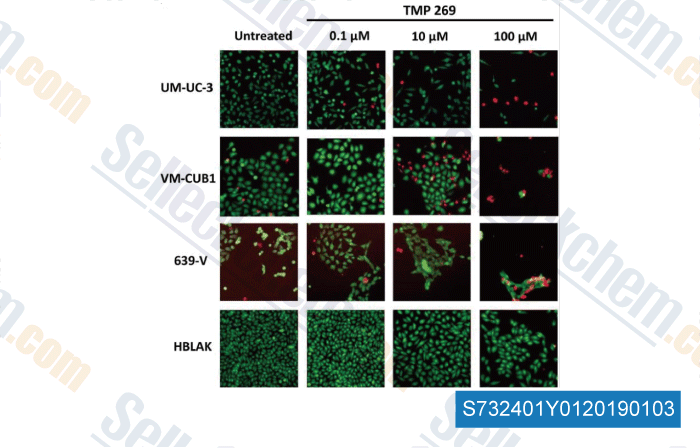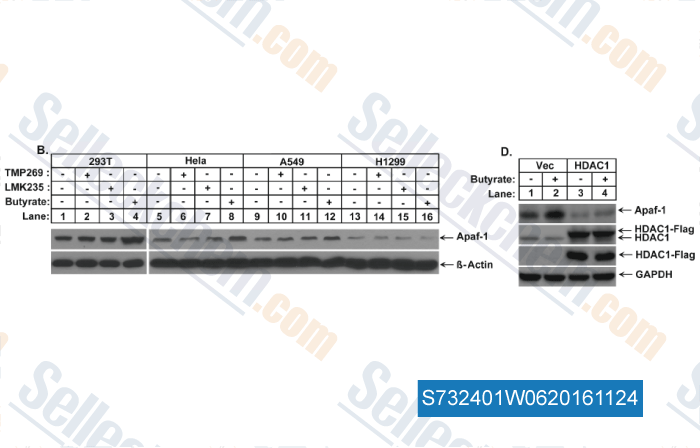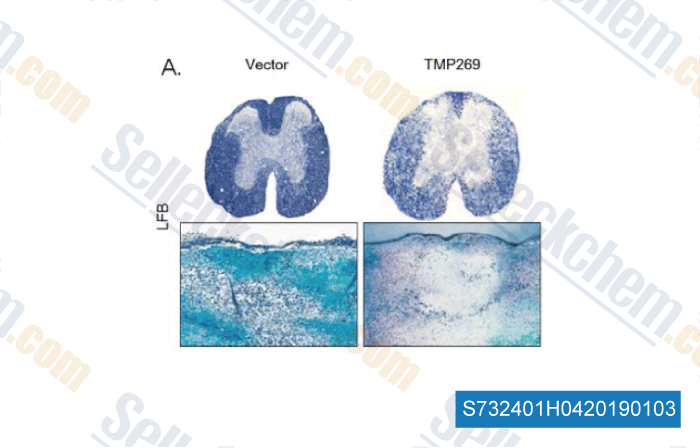|
Toll Free: (877) 796-6397 -- USA and Canada only -- |
Fax: +1-832-582-8590 Orders: +1-832-582-8158 |
Tech Support: +1-832-582-8158 Ext:3 Please provide your Order Number in the email. |
Technical Data
| Formula | C25H21F3N4O3S |
||||||
| Molecular Weight | 514.52 | CAS No. | 1314890-29-3 | ||||
| Solubility (25°C)* | In vitro | DMSO | 100 mg/mL (194.35 mM) | ||||
| Ethanol | 2 mg/mL (3.88 mM) | ||||||
| Water | Insoluble | ||||||
| In vivo (Add solvents to the product individually and in order) |
|
||||||
|
* <1 mg/ml means slightly soluble or insoluble. * Please note that Selleck tests the solubility of all compounds in-house, and the actual solubility may differ slightly from published values. This is normal and is due to slight batch-to-batch variations. * Room temperature shipping (Stability testing shows this product can be shipped without any cooling measures.) |
|||||||
Preparing Stock Solutions
Biological Activity
| Description | TMP269 is a potent, selective class IIa HDAC inhibitor with IC50 of 157 nM, 97 nM, 43 nM and 23 nM for HDAC4, HDAC5, HDAC7 and HDAC9, respectively. | ||||||||
|---|---|---|---|---|---|---|---|---|---|
| Targets |
|
||||||||
| In vitro | TMP269 has no impact on the mitochondrial activity and/or the viability of human CD4+ T cells at 10 μM, and may be used as tools to identify the endogenous substrates of the class IIa HDAC enzymes. [1] In IEC-18 intestinal epithelial cells, TMP269 prevents cell cycle progression, DNA synthesis, and proliferation induced in response to G protein-coupled receptor/PKD1 activation. [2] |
||||||||
| In vivo | TMP269 is a selective class IIa HDAC inhibitor. |
Protocol (from reference)
| Kinase Assay: |
|
|---|---|
| Cell Assay: |
|
References
Customer Product Validation

-
Data from [Data independently produced by , , Clin Epigenetics, 2018, 10(1):100]

-
Data from [Data independently produced by , , THE JOURNAL OF BIOLOGICAL CHEMISTRY, 2016, 291(14):7386-7395.]

-
Data from [Data independently produced by , , J Cell Biochem, 2018, 119(4):3081-3090]
Selleck's TMP269 has been cited by 31 publications
| In-Cell Testing of Zinc-Dependent Histone Deacetylase Inhibitors in the Presence of Class-Selective Fluorogenic Substrates: Potential and Limitations of the Method [ Biomedicines, 2024, 12(6)1203] | PubMed: 38927410 |
| High-throughput discovery and characterization of viral transcriptional effectors in human cells [ Cell Syst, 2023, 14(6):482-500.e8] | PubMed: 37348463 |
| Improvement of muscle strength in a mouse model for congenital myopathy treated with HDAC and DNA methyltransferase inhibitors [ Elife, 2022, 11e73718] | PubMed: 35238775 |
| The p300/CBP inhibitor A485 normalizes psoriatic fibroblast gene expression in vitro and reduces psoriasis-like skin inflammation in vivo [ J Invest Dermatol, 2022, S0022-202X(22)01937-6] | PubMed: 36174717 |
| Beta-hydroxybutyrate suppresses hepatic production of the ghrelin receptor antagonist, LEAP2 [ Endocrinology, 2022, bqac038] | PubMed: 35352108 |
| Angiogenic adipokine C1q-TNF-related protein 9 ameliorates myocardial infarction via histone deacetylase 7-mediated MEF2 activation [ Sci Adv, 2022, 8(48):eabq0898] | PubMed: 36459558 |
| Targeting cancer cell plasticity by HDAC inhibition to reverse EBV-induced dedifferentiation in nasopharyngeal carcinoma [ Signal Transduct Target Ther, 2021, 6(1):333] | PubMed: 34482361 |
| IL-4 inhibits regulatory T cells differentiation by HDAC9-mediated epigenetic regulation [ Cell Death Dis, 2021, 12(6):501] | PubMed: 34006836 |
| Butyrate and Class I Histone Deacetylase Inhibitors Promote Differentiation of Neonatal Porcine Islet Cells into Beta Cells [ Cells, 2021, 10(11)3249] | PubMed: 34831471 |
| Pre-Senescence Induction in Hepatoma Cells Favors Hepatitis C Virus Replication and Can Be Used in Exploring Antiviral Potential of Histone Deacetylase Inhibitors [ Int J Mol Sci, 2021, 22(9)4559] | PubMed: 33925399 |
RETURN POLICY
Selleck Chemical’s Unconditional Return Policy ensures a smooth online shopping experience for our customers. If you are in any way unsatisfied with your purchase, you may return any item(s) within 7 days of receiving it. In the event of product quality issues, either protocol related or product related problems, you may return any item(s) within 365 days from the original purchase date. Please follow the instructions below when returning products.
SHIPPING AND STORAGE
Selleck products are transported at room temperature. If you receive the product at room temperature, please rest assured, the Selleck Quality Inspection Department has conducted experiments to verify that the normal temperature placement of one month will not affect the biological activity of powder products. After collecting, please store the product according to the requirements described in the datasheet. Most Selleck products are stable under the recommended conditions.
NOT FOR HUMAN, VETERINARY DIAGNOSTIC OR THERAPEUTIC USE.
